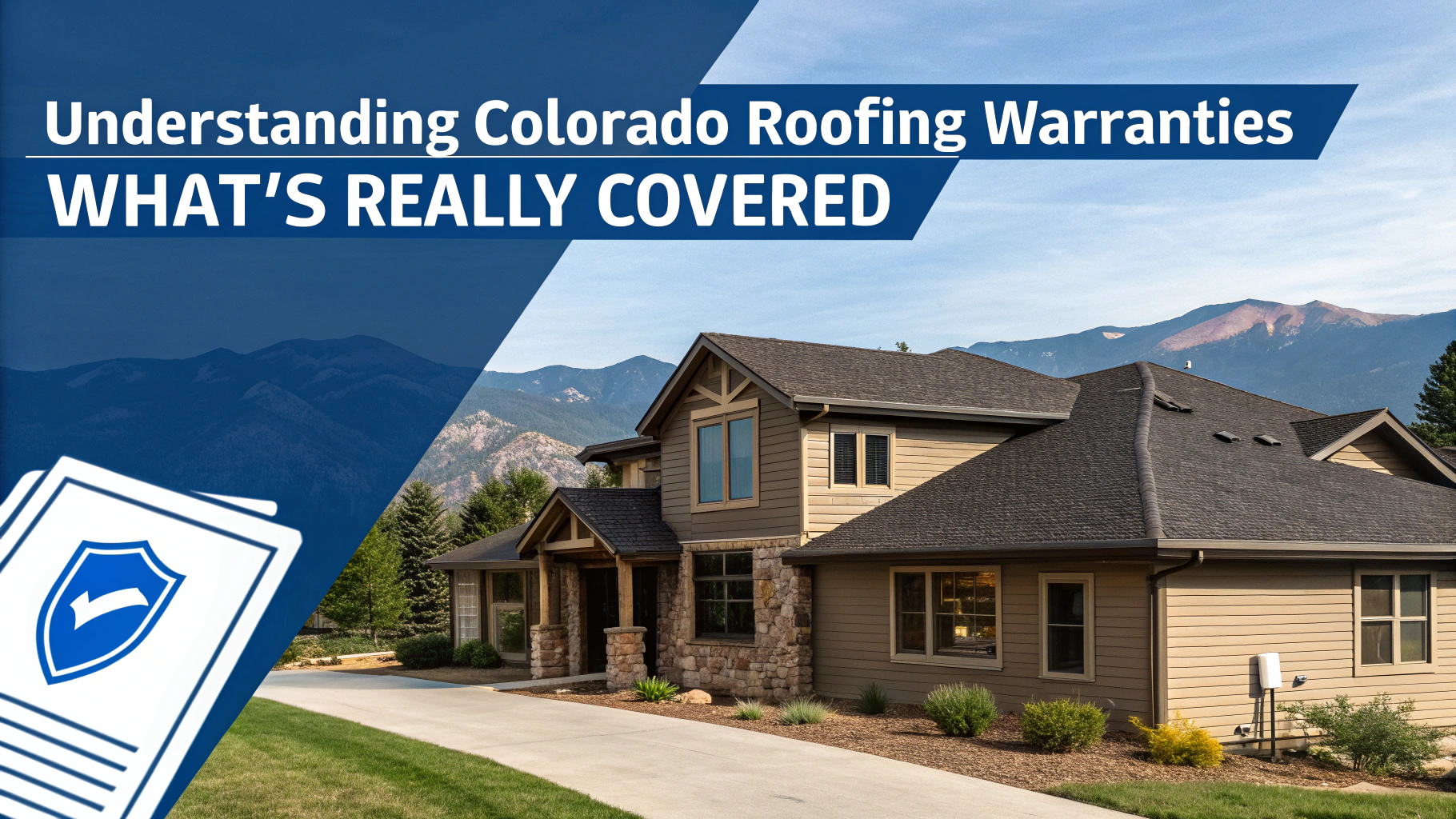Navigating roofing warranties in Colorado requires understanding the specific protections offered for your investment against the state’s unique weather challenges.
Colorado homeowners face extreme temperature swings, hailstorms, heavy snow, and intense UV exposure that can significantly impact roof performance and longevity.
A clear understanding of warranty coverage helps protect your investment and ensures you’re prepared for potential roofing issues.
Types of Colorado Roofing Warranties
- Manufacturer’s Material Warranty: Covers defects in the roofing materials (typically 20-30 years)
- Workmanship Warranty: Protects against installation errors (usually 2-10 years)
- Extended Warranties: Premium coverage combining material and labor protection
What’s Typically Covered
Standard manufacturer warranties cover material defects that cause leaks or premature failure.
- Manufacturing defects in shingles or roofing materials
- Material deterioration under normal weather conditions
- Color fading beyond normal weathering
- Wind damage up to specified mph ratings
Common Exclusions
Understanding warranty exclusions helps prevent unexpected costs.
- Damage from improper ventilation
- Ice dam formation
- Modifications after installation
- Extreme weather events beyond specified limits
- Improper maintenance
Colorado-Specific Considerations
Local weather patterns require specific warranty considerations.
- Hail damage coverage (check impact ratings)
- Snow load protection
- UV exposure limitations
- High-altitude considerations
Tips for Warranty Protection
- Register your warranty immediately after installation
- Keep detailed maintenance records
- Schedule regular professional inspections
- Document any damage with photos
- Read warranty terms completely before signing
Finding Reliable Coverage
| Warranty Type | Typical Coverage Length | What to Look For |
|---|---|---|
| Basic Limited | 20-30 years | Material defects only |
| Extended | 30-50 years | Materials + labor |
| Workmanship | 2-10 years | Installation coverage |
Maintaining Your Warranty
Regular maintenance keeps your warranty valid and your roof protected.
- Clean gutters seasonally
- Remove debris regularly
- Check for damage after storms
- Address repairs promptly
- Use authorized contractors for repairs
Resources and Support
Contact these organizations for additional warranty information:
- Colorado Roofing Association: (303) 484-0549
- National Roofing Contractors Association: (847) 299-9070
- Colorado Division of Insurance: (303) 894-7499
Making the Most of Your Roofing Investment
Select a warranty that matches your needs and budget while considering Colorado’s specific weather challenges.
- Compare multiple warranty options
- Consider upgrading to extended coverage
- Work with certified local contractors
- Keep detailed records of all maintenance
Filing a Warranty Claim
Understanding the proper process for filing warranty claims ensures smoother resolution of roofing issues.
- Document the damage thoroughly with photos
- Contact your contractor first for assessment
- Submit claims within specified timeframes
- Provide all required documentation
- Follow up regularly on claim status
Cost Considerations
Different warranty levels come with varying costs and coverage benefits.
- Basic warranties included in installation cost
- Extended coverage requires additional investment
- Consider long-term value vs. upfront costs
- Factor in typical Colorado repair expenses
Professional Installation Requirements
Proper installation is crucial for warranty validity.
- Use manufacturer-certified contractors
- Ensure proper permits are obtained
- Follow local building codes
- Document installation process
Securing Your Roofing Investment
A comprehensive warranty strategy protects your roof and financial investment in Colorado’s challenging climate.
- Choose coverage based on local weather patterns
- Maintain detailed documentation
- Stay proactive with maintenance
- Build relationships with trusted contractors
- Review and understand all warranty terms
FAQs
- What types of warranties are typically available for roofs in Colorado?
There are typically three types: manufacturer’s material warranties, contractor workmanship warranties, and extended manufacturer warranties that cover both materials and installation. - How long does a standard manufacturer’s warranty last on roofing materials in Colorado?
Most manufacturer’s warranties for asphalt shingles last 20-30 years, while premium materials can have warranties up to 50 years. - What typically voids a roofing warranty in Colorado?
Common warranty-voiding actions include improper installation, inadequate ventilation, installing new shingles over old ones, and repairs by non-authorized contractors. - Are hail and wind damage covered under standard roofing warranties in Colorado?
Most manufacturer warranties only cover material defects, not damage from severe weather. Hail and wind damage are typically covered by homeowner’s insurance rather than warranties. - What’s the difference between a prorated and non-prorated warranty?
A non-prorated warranty provides full coverage throughout the warranty period, while a prorated warranty’s coverage decreases over time based on the roof’s age. - Do Colorado roofing warranties cover labor costs for repairs?
Standard manufacturer warranties typically only cover materials. Labor costs are usually only covered under separate contractor workmanship warranties or extended manufacturer warranties. - How do high altitude and extreme weather conditions in Colorado affect roofing warranties?
Some manufacturers require specific high-altitude installation methods and materials for warranty validity in Colorado’s elevation and climate conditions. - What documentation do I need to maintain warranty coverage in Colorado?
You should keep the original warranty certificate, proof of purchase, installation records, and maintenance records, including any professional inspections or repairs. - Can I transfer my roof warranty to a new homeowner in Colorado?
Many warranties are transferable, but usually require paperwork and sometimes a transfer fee. Some warranties may only be transferable once or within a specific timeframe. - How often should I have my roof inspected to maintain warranty coverage in Colorado?
Most manufacturers and contractors recommend annual inspections and after severe weather events to maintain warranty coverage.
